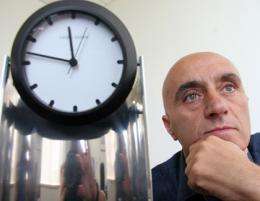Body clock regulates metabolism

(PhysOrg.com) -- UC Irvine researchers have discovered that circadian rhythms - our own body clock - regulate energy levels in cells. The findings have far-reaching implications, from providing greater insights into the bond between the body's day-night patterns and metabolism to creating new ways to treat cancer, diabetes, obesity and a host of related diseases.
In addition, Paolo Sassone-Corsi, Distinguished Professor and Chair of Pharmacology, and his colleagues found that the proteins involved with circadian rhythms and metabolism are intrinsically linked and dependent upon each other. Their study appears online in Science Express.
"Our circadian rhythms and metabolism are closely partnered to ensure that cells function properly and remain healthy," Sassone-Corsi said. "This discovery opens a new window for us to understand how these two fundamental processes work together, and it can have a great impact on new treatments for diseases caused by cell energy deficiencies."
Circadian rhythms of 24 hours govern fundamental physiological functions in almost all organisms. The circadian clocks are the essential time-tracking systems in our bodies that anticipate environmental changes and adapt to the appropriate time of day. Disruption of these rhythms can profoundly influence human health and has been linked to obesity, diabetes, insomnia, depression, coronary heart diseases and cancer.
Sassone-Corsi already had identified that the enzyme protein CLOCK is an essential molecular gear of the circadian machinery and interacts with a protein, SIRT1, which senses cell energy levels and modulates aging and metabolism.
In this study, he and his colleagues show that CLOCK works in balance with SIRT1 to direct activity in a cell pathway by which metabolic proteins send signals called the NAD+ salvage pathway. In turn, a key protein in that pathway, NAMPT, helps control CLOCK levels, creating a tightly regulated codependency between our circadian clock and metabolism.
"When the balance between these two vital processes is upset, normal cellular function can be disrupted," Sassone-Corsi said. "And this can lead to illness and disease."
The findings suggest that proper sleep and diet may help maintain or rebuild this balance, he said, and also help explain why lack of rest or disruption of normal sleep patterns can increase hunger, leading to obesity-related illnesses and accelerated aging.
The specific interaction between CLOCK and SIRT1 and the NAD+ salvage pathway also presents a starting point for drug development aimed at curbing cell dysfunction and death, thereby helping to solve major medical problems such cancer and diabetes.
Source: University of California - Irvine















